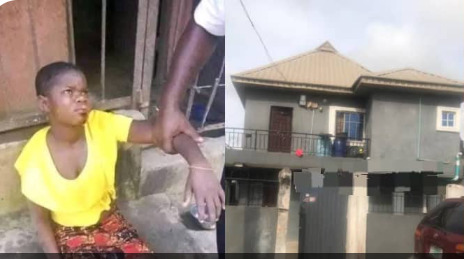
“If Anything Happens to Me, Hold Akpabio, Yahaya Bello, and Gov. Ododo Responsible” — Senator Natasha Akpoti Raises Alarm After Armed Attack on Her Kogi Residence

In a chilling turn of events that has further intensified political tension in Nigeria, Senator Natasha Akpoti-Uduaghan has issued a grave statement implicating top political figures in the event of any harm that may befall her. Following a shocking attack on her family home in Kogi State by armed men, the senator has publicly declared that should anything untoward happen to her, the Senate President, Godswill Akpabio; former Kogi State Governor, Yahaya Bello; and the incumbent Governor, Usman Ododo, should be held accountable.
The attack, which occurred in the early hours of the day, sent shockwaves through both local communities and the national political scene. According to initial eyewitness reports, heavily armed men stormed the Akpoti-Uduaghan family residence in Ihima, Okehi Local Government Area of Kogi State. The invaders reportedly fired sporadically into the air, causing panic in the neighborhood and leaving residents fleeing for safety. Though no casualties have been confirmed, the senator has labeled the incident a politically motivated attack.
Taking to her social media account shortly after the attack, Senator Natasha did not mince words. “Nigeria Police, I reiterate, should any harm befall me, Nigerian Senate President Godswill Akpabio, Ex Gov. Yahaya Bello and Gov. Usman Ododo of Kogi State should be held responsible,” she wrote in a powerful and emotionally charged post. The statement has since gone viral, igniting fierce debates and raising concerns over the increasing risks faced by outspoken politicians, particularly in regions fraught with political rivalry.
Senator Natasha, a prominent voice in Kogi State politics and a strong advocate for transparency and justice, has not been new to confrontation. Her rise in political influence has often placed her at odds with the establishment, particularly the All Progressives Congress (APC) power bloc in Kogi State, formerly led by Yahaya Bello and now headed by his political protégé, Governor Usman Ododo. Her victory at the Kogi Central senatorial elections was considered a significant upset to the APC’s dominance in the region, and ever since, tensions have simmered below the surface.
While the Nigerian Police Force has yet to release an official statement regarding the incident, civil society groups, political commentators, and concerned citizens have begun calling for an immediate and transparent investigation. There is a growing chorus demanding that law enforcement agencies act swiftly to identify the attackers and determine whether the senator’s claims of political persecution hold water. Calls have also been made for the National Assembly and the Presidency to take a strong stance on ensuring her safety.
The names mentioned by the senator in her statement are not minor players. Senate President Godswill Akpabio, a key figure in the ruling party and one of the most powerful politicians in the country, has yet to respond to the allegations. Similarly, Yahaya Bello, who has been embroiled in numerous controversies both during and after his tenure as governor, has remained silent. The current Governor, Usman Ododo, a close ally of Bello, has also not issued any formal statement at the time of reporting.
Political observers have noted that the senator’s open accusation is not only courageous but also emblematic of a growing frustration among opposition figures who feel increasingly unsafe in the current political climate. Senator Natasha’s declaration has been praised by many as bold and necessary, while others caution that such accusations must be backed by solid evidence to avoid further political instability.
However, for Senator Natasha, this is more than a political game—it is a matter of personal safety. She has recounted multiple threats and incidents in the past, including the harassment of her supporters and what she describes as “targeted intimidation” designed to silence her advocacy. “Enough is enough,” she said in a follow-up video shared online. “I refuse to be intimidated into silence. If speaking out gets me killed, then so be it—but I will not allow Kogi to become a playground for impunity.”
The attack on her residence is a disturbing escalation in what appears to be a pattern of political violence in Kogi State. The state, often viewed as one of the most volatile political battlegrounds in Nigeria, has witnessed several episodes of electoral violence, intimidation of opposition voices, and clashes between rival party supporters. Many fear that the recent attack signals a deeper, more dangerous shift, especially with the 2027 general elections slowly approaching.
Citizens from across Nigeria have taken to social media to express support for the senator, with hashtags like #JusticeForNatasha and #ProtectOurPoliticians trending on X (formerly Twitter). Some have urged President Bola Ahmed Tinubu to personally intervene and ensure that Senator Natasha and other vulnerable voices are protected. Others have criticized the silence of national institutions, arguing that threats against public figures, especially women in politics, should never be taken lightly.
As the nation watches closely, all eyes are now on the Nigerian Police and federal authorities to take decisive action. The question on everyone’s lips remains: will those in power address these accusations head-on or sweep them under the rug? The stakes are high, and the outcome of this case could set a precedent for how political violence and intimidation are treated in the country going forward.
For Senator Natasha Akpoti-Uduaghan, the fight is not just about her personal safety—it is about standing up to what she describes as “an entrenched culture of fear and silencing.” Whether justice will be served or not remains to be seen, but one thing is certain: her voice has sparked a national conversation that can no longer be ignored.


